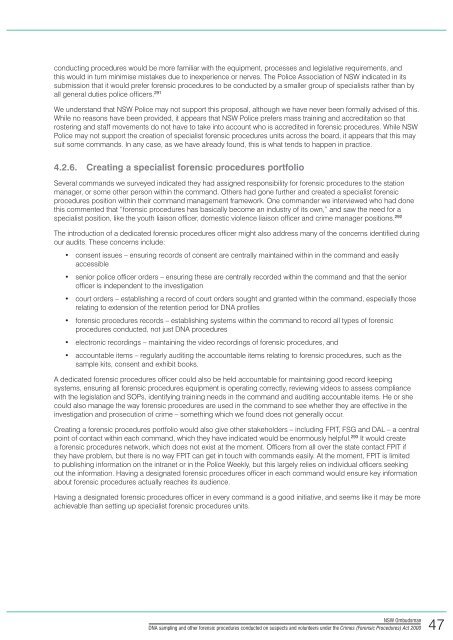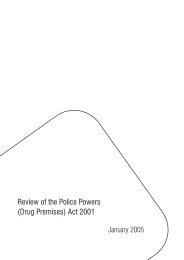Crimes (Forensic Procedures) Act 2000 - NSW Ombudsman - NSW ...
Crimes (Forensic Procedures) Act 2000 - NSW Ombudsman - NSW ...
Crimes (Forensic Procedures) Act 2000 - NSW Ombudsman - NSW ...
Create successful ePaper yourself
Turn your PDF publications into a flip-book with our unique Google optimized e-Paper software.
conducting procedures would be more familiar with the equipment, processes and legislative requirements, and<br />
this would in turn minimise mistakes due to inexperience or nerves. The Police Association of <strong>NSW</strong> indicated in its<br />
submission that it would prefer forensic procedures to be conducted by a smaller group of specialists rather than by<br />
all general duties police officers. 291<br />
We understand that <strong>NSW</strong> Police may not support this proposal, although we have never been formally advised of this.<br />
While no reasons have been provided, it appears that <strong>NSW</strong> Police prefers mass training and accreditation so that<br />
rostering and staff movements do not have to take into account who is accredited in forensic procedures. While <strong>NSW</strong><br />
Police may not support the creation of specialist forensic procedures units across the board, it appears that this may<br />
suit some commands. In any case, as we have already found, this is what tends to happen in practice.<br />
4.2.6. Creating a specialist forensic procedures portfolio<br />
Several commands we surveyed indicated they had assigned responsibility for forensic procedures to the station<br />
manager, or some other person within the command. Others had gone further and created a specialist forensic<br />
procedures position within their command management framework. One commander we interviewed who had done<br />
this commented that “forensic procedures has basically become an industry of its own,” and saw the need for a<br />
specialist position, like the youth liaison officer, domestic violence liaison officer and crime manager positions. 292<br />
The introduction of a dedicated forensic procedures officer might also address many of the concerns identified during<br />
our audits. These concerns include:<br />
• consent issues – ensuring records of consent are centrally maintained within in the command and easily<br />
accessible<br />
• senior police officer orders – ensuring these are centrally recorded within the command and that the senior<br />
officer is independent to the investigation<br />
• court orders – establishing a record of court orders sought and granted within the command, especially those<br />
relating to extension of the retention period for DNA profiles<br />
• forensic procedures records – establishing systems within the command to record all types of forensic<br />
procedures conducted, not just DNA procedures<br />
• electronic recordings – maintaining the video recordings of forensic procedures, and<br />
• accountable items – regularly auditing the accountable items relating to forensic procedures, such as the<br />
sample kits, consent and exhibit books.<br />
A dedicated forensic procedures officer could also be held accountable for maintaining good record keeping<br />
systems, ensuring all forensic procedures equipment is operating correctly, reviewing videos to assess compliance<br />
with the legislation and SOPs, identifying training needs in the command and auditing accountable items. He or she<br />
could also manage the way forensic procedures are used in the command to see whether they are effective in the<br />
investigation and prosecution of crime – something which we found does not generally occur.<br />
Creating a forensic procedures portfolio would also give other stakeholders – including FPIT, FSG and DAL – a central<br />
point of contact within each command, which they have indicated would be enormously helpful. 293 It would create<br />
a forensic procedures network, which does not exist at the moment. Officers from all over the state contact FPIT if<br />
they have problem, but there is no way FPIT can get in touch with commands easily. At the moment, FPIT is limited<br />
to publishing information on the intranet or in the Police Weekly, but this largely relies on individual officers seeking<br />
out the information. Having a designated forensic procedures officer in each command would ensure key information<br />
about forensic procedures actually reaches its audience.<br />
Having a designated forensic procedures officer in every command is a good initiative, and seems like it may be more<br />
achievable than setting up specialist forensic procedures units.<br />
<strong>NSW</strong> <strong>Ombudsman</strong><br />
DNA sampling and other forensic procedures conducted on suspects and volunteers under the <strong>Crimes</strong> (<strong>Forensic</strong> <strong>Procedures</strong>) <strong>Act</strong> <strong>2000</strong> 47

















